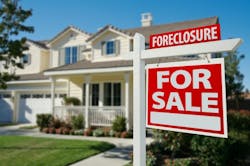Which Cities Are Most at Risk for Coronavirus-Caused Foreclosures?
While stay-at-home orders continue and unemployment soars, the coronavirus is hitting the economy hard. As builders look around, they may be concerned that things are looking a little bit too familiar—as in 2008 familiar. But unlike the Great Recession, experts say that foreclosures will not critically impact housing markets nationwide, thanks to smarter lending and the government freezing evictions for 60 days for many mortgages. Instead, evictions and foreclosures may be more localized in cities in New Jersey or Florida that already struggle with a lack of affordable housing.
With millions of Americans filing for unemployment in the past few weeks amid the spreading coronavirus pandemic, and in spite of mortgage forbearance measures, a wave of foreclosures may not be far behind—especially for those living in the Northeast and parts of the South, says a recent report.
But real estate experts have predicted that this will be no tidal wave, unlike during the Great Recession, in which millions of people lose their homes. This time around, buyers are more financially qualified, and subprime and "liar loans," for which income hasn't been verified, have all but disappeared, making the market more stable. And unlike the last downturn, the federal government and many individual banks are offering forbearance and a stay of evictions for 60 days for many mortgages.
